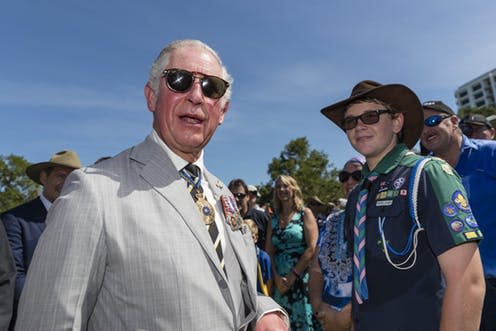Prince Charles, the Commonwealth and a lesson in good grace

Does it matter who succeeds the Queen as Head of the Commonwealth? It matters very much to the Queen, who has always taken her Commonwealth role very seriously. Understandably, it also matters to Prince Charles. He has waited his whole life to inherit his mother’s roles and is reportedly – and understandably – unimpressed with the idea that one of them might be taken away from him. But should it concern the rest of us?
The days when British people took an active interest in the Commonwealth are long gone. What had originally been called the British Commonwealth grew out of the British Empire and was essentially an attempt to form an English-speaking grouping of nations that would continue Britain’s old imperial influence into the post-imperial world. It was, in many ways, a fulfilment of the dreams of the old Victorian imperial federalists.
The humbling experiences of World War II, which saw Britain’s international and imperial prestige take a battering, caused the British Commonwealth to be recast simply as “The Commonwealth”. But it still seemed only natural that the British monarch, first George VI and then the present Queen, should preside over it. However, “Head of the Commonwealth” was never written into the royal title and there is no rule that says it should automatically pass to the heir to the British throne.
What’s the Commonwealth for?
Apart from the Ugandan dictator Idi Amin, who never missed an opportunity to insult or demean the old colonial power, no one else has ever laid claim to the title. But as eyes move inevitably towards the post-Elizabethan age, it is perhaps unsurprising that Prince’s Charles’s claim to inherit the title should come into question.
Most British people seem to know very little about the Commonwealth. The BBC News website even marked the start of the Commonwealth Games in Australia with a headline “What even is the Commonwealth?” Compared with the celebrations that used to mark Empire Day each year, Commonwealth Day passes almost completely unnoticed in Britain.

If the Commonwealth comes in for serious political analysis at all, it’s usually to point out the complete failure of Britain’s attempts to leave a legacy of democracy in its former colonies, as one Commonwealth country after another, especially in Africa, slipped into dictatorship or civil war. Even the Commonwealth Games, colourful and friendly though they invariably are, can be characterised as international sport-lite. With no Americans, Russians, Chinese or continental Europeans, it hardly compares to the Olympics for excitement. Is there still a place for this post-imperial network of nations in our decidedly post-imperial world?
If the Commonwealth is thought of principally as British-centred, and especially if it is the focus of Brexiteers’ hopes for Britain’s future international role, the answer is probably no.
The shocking case of the recent deportation of Windrush generation immigrants shows that, for the Home Office at least, Commonwealth ties cut no ice when it comes to rules of residency.
Tough act to follow
But the Commonwealth has evolved over the years and developed new roles to suit the changing world. In the 1960s, 70s and 80s, it was heavily taken up with leading the opposition to white minority rule in South Africa, often to the exasperation of Margaret Thatcher. By the 1990s, it had taken on more of a collaborative role in helping developing countries.
In the post-Cold War world, the Commonwealth became a forum for the sort of middle way originally envisaged by the non-aligned movement of the 1950s. The 1971 Singapore Declaration, extended in 1991 at Harare, established the Commonwealth as a body devoted to democratic principles, the rule of law, and the eradication of inequality and racism. Poorer countries, who might wield little influence in the United Nations or in their own regional organisations, could look to it for support and a voice. In 1995, Mozambique became the first country to join the Commonwealth without having been a British colony, followed in 2009 by Rwanda. At a time when the old superpowers are stirring again and there is talk of a new Cold War, the Commonwealth can provide a framework in which smaller and less powerful nations can work together constructively.
Central to this process, as many Commonwealth heads of government have recognised, has been the Queen. She has developed close personal ties with many Commonwealth leaders, and has often proved capable of calming troubled waters or maintaining warm relations. Ironically, however, it is her very success which has made her son’s right to succeed her less clear. She has held onto the role not just by her own authority but because she is so obviously good at it. What guarantee is there that Charles would be equally good?
British royalty has survived into the early 21st century against the odds and seems as popular now as it has ever been. But a monarchy’s fortunes can turn on the individual quirks or miscalculations of a single monarch. Monarchy survives by knowing what and when to concede. The days when the leadership of the Commonwealth would pass to the British monarch as a right are probably over. Prince Charles would certainly win more respect by recognising and accepting that the Commonwealth should have a free choice in the matter than by petulantly insisting that it should be his. After all, they might even choose him.
This article was originally published on The Conversation. Read the original article.
Related Video: Meghan Markle Surprises an Inspired Fan

Sean Lang does not work for, consult, own shares in or receive funding from any company or organisation that would benefit from this article, and has disclosed no relevant affiliations beyond their academic appointment.

 Yahoo Sport
Yahoo Sport 





































